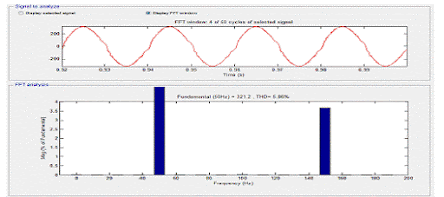ABSTRACT:
In this paper, a modified cascaded H-bridge multilevel
inverter (MLI) is proposed and designed for solar applications. Generally, as
the level of conventional multilevel inverter increases, the required number of
switches and size increases. The proposed topology is cascade of unit stages
which involves 5 switches and two voltage source; moreover a unit stage is
capable of generating 5 levels. Also, the detailed analysis of cascaded
multilevel inverter is discussed which incorporates three different
methodologies involving less number of power devices in order to generate
maximum number of levels. This results into reduction in gate drive circuitry
and less switching losses. The proposed MLI is designed for power 1.5kW and In phase
level shifting SPWM technique has been incorporated in which 5kHz carrier wave
is compared with 50Hz of sinusoidal wave with a modulation index of 0.8. As a
result, total harmonic distortion (THD) is achieved as 4.71% with LC-filter for
above mentioned multilevel inverter. The circuits are modeled and simulated
with the help of MATLAB/SIMULINK.
KEYWORDS:
1.
Modified
cascaded H-bridge MLI
2.
Solar
3.
SPWM
techniques
4.
Total Harmonic
Distortions
Fig1. Proposed N-level modified cascaded MLI
Fig.2 Output voltage and current waveforms (9-level) without filter
Fig.3 Output voltage and current waveform (9-level) with LC- filter
Fig.4 (a)-(c) Gate Pulse for 10 switches
Fig.5 Output voltage and current waveforms (13-level) without filter
Fig.6 Output voltage and current waveform (13-level) with LC- filter
Fig.7 Output voltage and current waveforms (17-level) without filter
Fig.8 Output voltage and current waveform (17-level) with LC- filter
Fig.9 THD of 9-level (first methodology) without filter
Fig.10 THD of 9-level (first methodology) with filter
Fig.11 THD of 13-level (Second methodology) without filter
Fig.12 THD of 13-level (second methodology) with filter
Fig.13 THD of 17-level (Third methodology) without filter
Fig.14 THD of 17-level (Third methodology) with filter
REFERENCES:
[1]
Wei Zhao; Hyuntae Choi; G. Konstantinou; M. Ciobotaru; and V. G. Agelidis
“Cascaded H-bridge Multilevel Converter for Large-scale PV Grid-Integration
with Isolated DC-DC stage” PEDG, IEEE 2012.
[2]
S. Rivera; S. Kouro; B. Wu; J. I. Leon; J. Rodriguez; and L. G. Franquelo
"Cascaded H-bridge multilevel converter multistring topology for large
scale photovoltaic systems," IEEE ISIE 2011, pp.1837-1844.
[3]
N.A. Rahim; K. Chaniago; and J. Selvaraj "Single-Phase Seven-Level Grid
Connected Inverter for Photovoltaic System", IEEE Transactions on
Industrial Electronics, Vol. 58, No. 6, June 2011, pp. 2435-2443
[4]
B. Singh; N. Mittal; and K. S. Verma “Multi-Level Inverter: A Literature Survey
On Topologies And Control Strategies”, International Journal of Reviews in
Computing, Vol. 10, July 2012, pp. 1-16
[5]
Zhiguo pan; F .Z Peng; Victor Stefanoic; and Mickey Leuthen “A Diode-Clamped
Multilevel Converter with Reduced Number of Clamping Diodes.”2004 IEEE.













